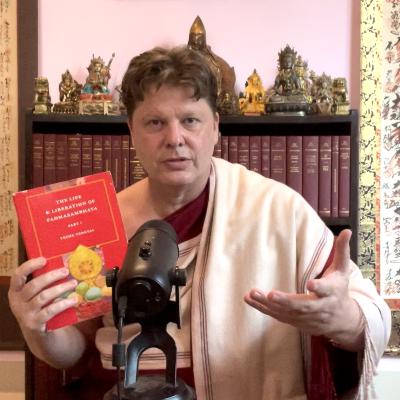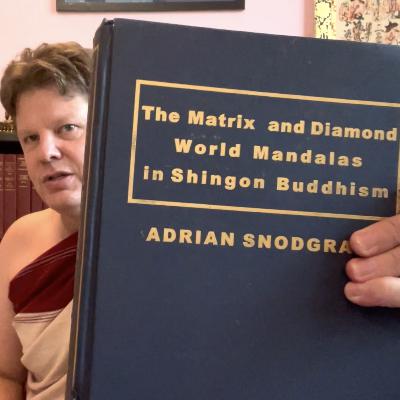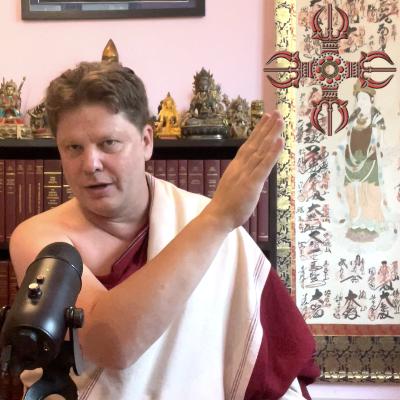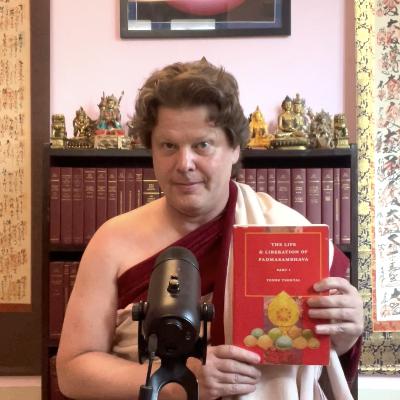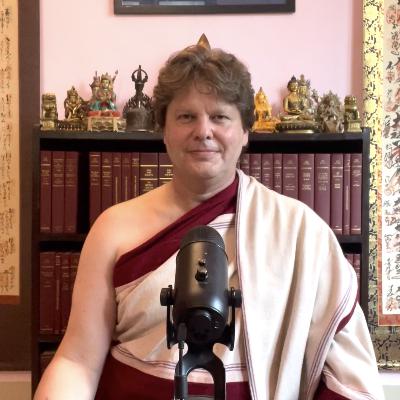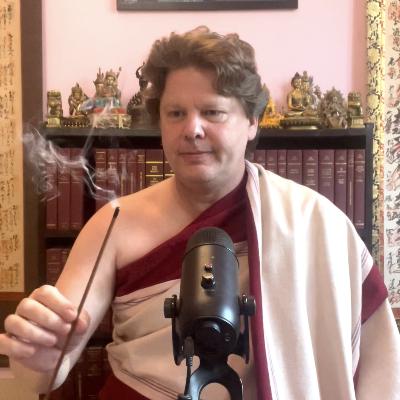Discover Buddhist Books Podcast
Buddhist Books Podcast

225 Episodes
Reverse
This is Part 2 of my recital of the "The Matrix and Diamond World Mandalas in Shingon Buddhism" by Adrian Snodgrass. Shingon Buddhism is, put simply, the Japanese version of Vajrayana Buddhism. Kobo Daishi traveled to China and received the teachings and scriptures of Vajrayana Buddhism, then returned to Japan and founded the Shingon school at the top of Mount Koyasan in 815 CE, where it still flourishes today.
This is Part 146 of my recital of the "Tipiṭaka," the "Three Baskets" of pre-sectarian Buddhism, as translated into English from the original Pali Language. In this episode, we'll continue reading "Mahāvagga II," from the "Vinaya Piṭaka," the first of the three "Piṭaka," or "Baskets." "Mahāvagga" literally means "Great Division."
This is Part 145 of my recital of the "Tipiṭaka," the "Three Baskets" of pre-sectarian Buddhism, as translated into English from the original Pali Language. In this episode, we'll begin reading "Mahāvagga II," from the "Vinaya Piṭaka," the first of the three "Piṭaka," or "Baskets." "Mahāvagga" literally means "Great Division."
This is Part 144 of my recital of the "Tipiṭaka," the "Three Baskets" of pre-sectarian Buddhism, as translated into English from the original Pali Language. In this episode, we'll finish reading "Mahāvagga I," from the "Vinaya Piṭaka," the first of the three "Piṭaka," or "Baskets." "Mahāvagga" literally means "Great Division."
This is Part 143 of my recital of the "Tipiṭaka," the "Three Baskets" of pre-sectarian Buddhism, as translated into English from the original Pali Language. In this episode, we'll continue reading "Mahāvagga I," from the "Vinaya Piṭaka," the first of the three "Piṭaka," or "Baskets." "Mahāvagga" literally means "Great Division."
This is Part 13 of my recital of the "The Life & Liberation of Padmasambhava," a translation of "Padma Thang-yig," by Yeshe Tsogyal. In this episode, we'll read Cantos 22, 23, 24, 25 & 26.
This is Part 142 of my recital of the "Tipiṭaka," the "Three Baskets" of pre-sectarian Buddhism, as translated into English from the original Pali Language. In this episode, we'll continue reading "Mahāvagga I," from the "Vinaya Piṭaka," the first of the three "Piṭaka," or "Baskets." "Mahāvagga" literally means "Great Division."
This is Part 141 of my recital of the "Tipiṭaka," the "Three Baskets" of pre-sectarian Buddhism, as translated into English from the original Pali Language. In this episode, we'll continue reading "Mahāvagga I," from the "Vinaya Piṭaka," the first of the three "Piṭaka," or "Baskets." "Mahāvagga" literally means "Great Division."
This is Part 140 of my recital of the "Tipiṭaka," the "Three Baskets" of pre-sectarian Buddhism, as translated into English from the original Pali Language. In this episode, we'll continue reading "Mahāvagga I," from the "Vinaya Piṭaka," the first of the three "Piṭaka," or "Baskets." "Mahāvagga" literally means "Great Division."
This is Part 139 of my recital of the "Tipiṭaka," the "Three Baskets" of pre-sectarian Buddhism, as translated into English from the original Pali Language. In this episode, we'll continue reading "Mahāvagga I," from the "Vinaya Piṭaka," the first of the three "Piṭaka," or "Baskets." "Mahāvagga" literally means "Great Division."
This is Part 1 of my recital of the "The Matrix and Diamond World Mandalas in Shingon Buddhism" by Adrian Snodgrass. Shingon Buddhism is, put simply, the Japanese version of Vajrayana Buddhism. Kobo Daishi traveled to China and received the teachings and scriptures of Vajrayana Buddhism, then returned to Japan and founded the Shingon school at the top of Mount Koyasan in 815 CE, where it still flourishes today.
This is Part 138 of my recital of the "Tipiṭaka," the "Three Baskets" of pre-sectarian Buddhism, as translated into English from the original Pali Language. In this episode, we'll continue reading "Mahāvagga I," from the "Vinaya Piṭaka," the first of the three "Piṭaka," or "Baskets." "Mahāvagga" literally means "Great Division."
In this Special Episode of Buddhist Books Podcast, we'll be watching Banmei Takahashi's 2009 film, "Zen." "Zen" is a historical bio-pic about Zen Master Dogen, who first brought Chan Buddhism from China to Japan, becoming the founder of the first Japanese Zen sect in the early 13th century.
This is Part 137 of my recital of the "Tipiṭaka," the "Three Baskets" of pre-sectarian Buddhism, as translated into English from the original Pali Language. In this episode, we'll continue reading "Mahāvagga I," from the "Vinaya Piṭaka," the first of the three "Piṭaka," or "Baskets." "Mahāvagga" literally means "Great Division."
This is Part 136 of my recital of the "Tipiṭaka," the "Three Baskets" of pre-sectarian Buddhism, as translated into English from the original Pali Language. In this episode, we'll continue reading "Mahāvagga I," from the "Vinaya Piṭaka," the first of the three "Piṭaka," or "Baskets." "Mahāvagga" literally means "Great Division."
This is Part 12 of my recital of the "The Life & Liberation of Padmasambhava," a translation of "Padma Thang-yig," by Yeshe Tsogyal. In this episode, we'll read Canto 20 & 21.
This is Part 135 of my recital of the "Tipiṭaka," the "Three Baskets" of pre-sectarian Buddhism, as translated into English from the original Pali Language. In this episode, we'll continue reading "Mahāvagga I," from the "Vinaya Piṭaka," the first of the three "Piṭaka," or "Baskets." "Mahāvagga" literally means "Great Division."
This is Part 134 of my recital of the "Tipiṭaka," the "Three Baskets" of pre-sectarian Buddhism, as translated into English from the original Pali Language. In this episode, we'll continue reading "Mahāvagga I," from the "Vinaya Piṭaka," the first of the three "Piṭaka," or "Baskets." "Mahāvagga" literally means "Great Division."
This is Part 133 of my recital of the "Tipiṭaka," the "Three Baskets" of pre-sectarian Buddhism, as translated into English from the original Pali Language. In this episode, we'll continue reading "Mahāvagga I," from the "Vinaya Piṭaka," the first of the three "Piṭaka," or "Baskets." "Mahāvagga" literally means "Great Division."
This is Part 132 of my recital of the "Tipiṭaka," the "Three Baskets" of pre-sectarian Buddhism, as translated into English from the original Pali Language. In this episode, we'll continue reading "Mahāvagga I," from the "Vinaya Piṭaka," the first of the three "Piṭaka," or "Baskets." "Mahāvagga" literally means "Great Division."







